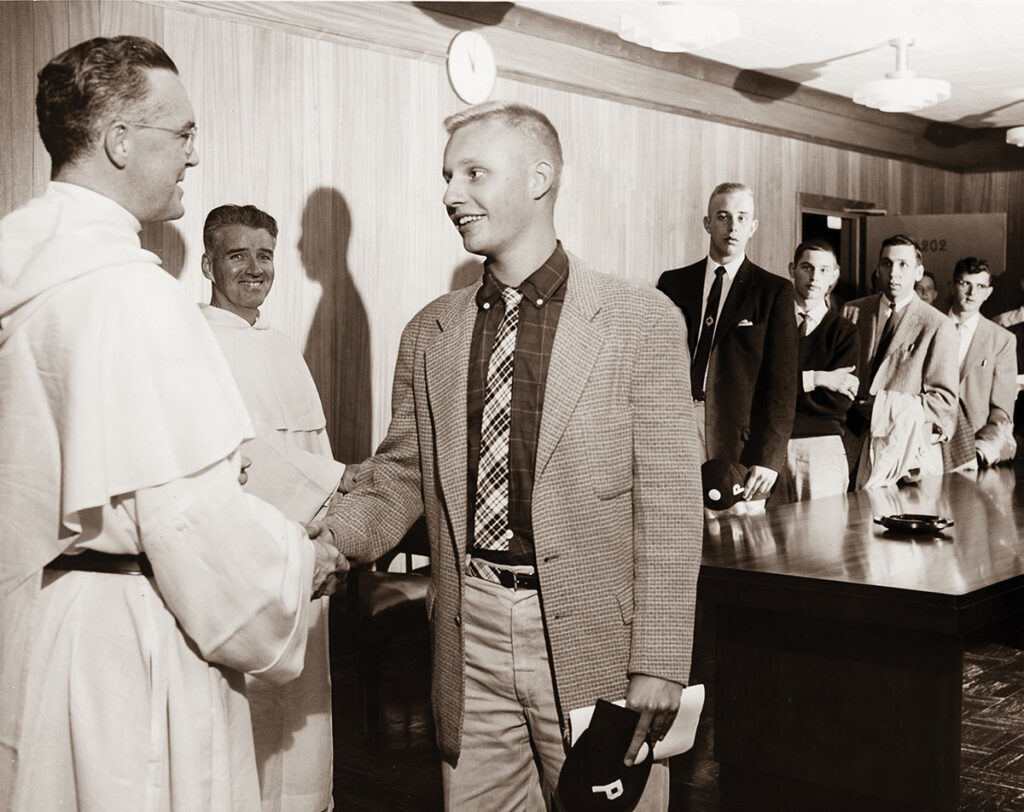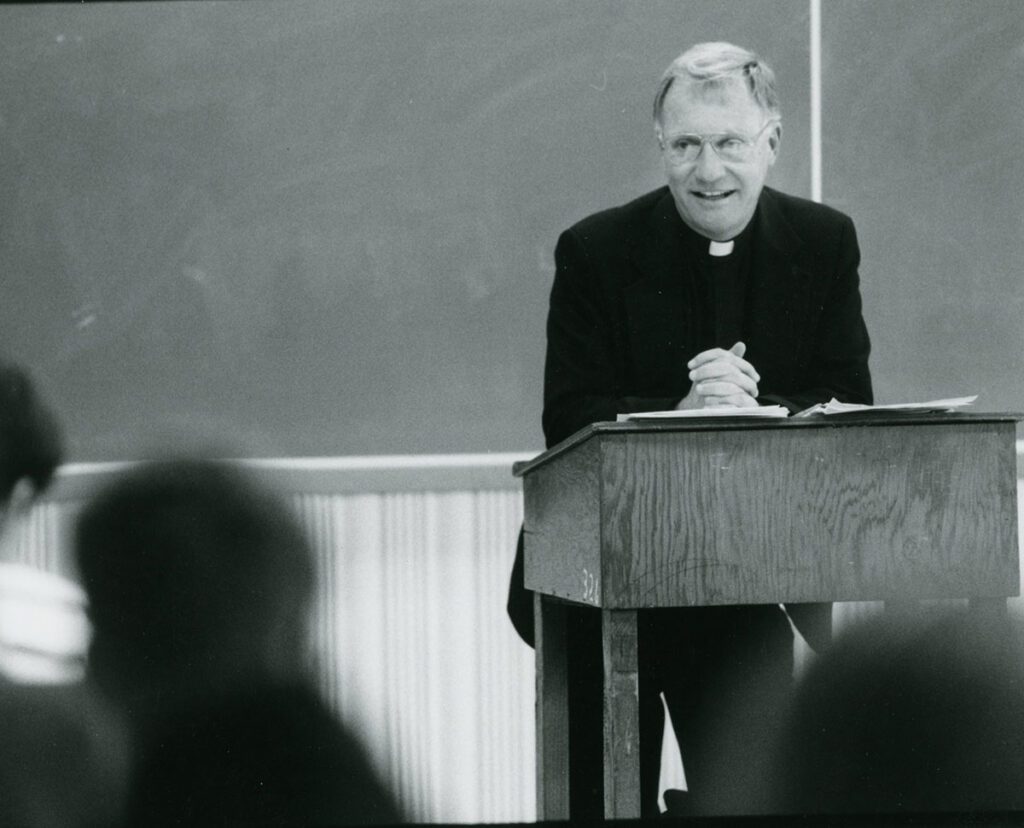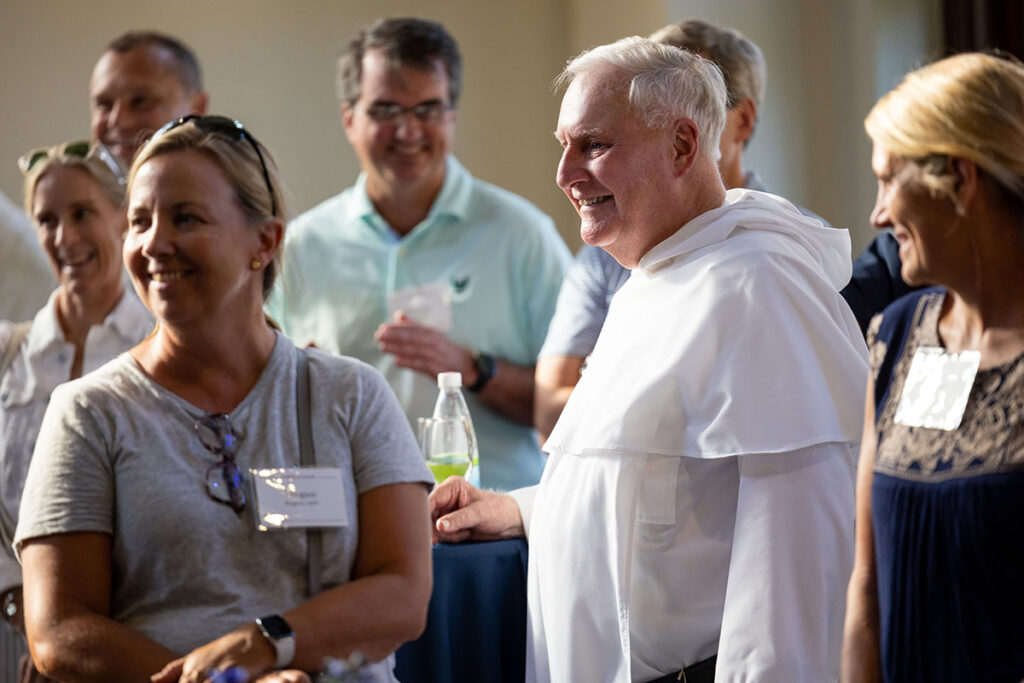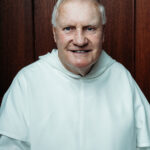The Last Word: Father Quigley on growing old
By Rev. James Quigley, O.P. ’60
I’m growing old, not getting old. I like to think that way, as “getting old” seems passive. It sounds as
though it happens without your permission. “Growing old” is active, a choice, a deliberate movement forward to completion and fulfillment. I’ve been a Dominican priest for almost 60 years. I am grateful to God for the chance to minister, to preach the gospel to so many different people and different cultures, to women and men of different ages, education, and languages, poor and not so poor. “Divine providence” has taken good care of me, and I can only say thank you. I am especially grateful for some 40 years with the Providence College community — Dominicans, students, faculty, staff, and alumni.
There are some 58,000 Providence College alumni. A good number of them, of us, are “growing old.”
T.S. Elliot, in the second section of his poem Four Quartets, writes: “In my beginning is my end … in my end is my beginning.” Growing old, of course, is inevitable. As I move to my “end,” how do I handle this time of life? How do I still serve in my “winter years?”

A lot of factors play into just how we elderly move forward — health, family, finances, energy, responsibilities, interests, mental attention, physical strength, religious faith, spirituality. For many of us, the daily calendar is no longer filled. Time is available. How to use that time?A brother Dominican, Father Joseph Guido, O.P., wrote an essay, Winter’s Grace, (Providence College Magazine, Winter 2011) in which he says: “The old develop the mind of winter and see deeply what most see only superficially. They may even see what Gerard Manley Hopkins called the ‘inscape,’ the distinctive nature of things, and so have the privilege of seeing as God sees and of seeing God in all things.”
There have never been so many elderly people, so many of us in history. What is our mission? What
can we do to help humanize life for those who are younger? Pope Francis tells us: “We elderly often have a special sensitivity for care, for reflection, and for affection. We are, or we can become, teachers of tender- ness.” He calls for a “revolution of tenderness.” Msgr. Bill Lyons, my colleague on the seminary faculty of the Pontifical North American College in Rome, in his last days suffered from cancer. Seminarians frequently visited him, first in his room and then in hospice. One said to me, “You can tell him anything.” Bill, a priest in winter, was a father figure, a wisdom figure. Aging women and men can tenderly teach, support, encourage, and guide younger women and men. They ought not to be seen as a threat, or to simply be discarded, seen as a burden. We are a gift, or can be, for a family, for a community, for a college, for society, for Church. To be “old” is a privilege.

Pope Francis, himself an elder, has established in the Catholic world a day honoring the elderly and grandparents. It is celebrated on the last Sunday of July. On that day appreciation, honor, respect, and prayer are to be offered for the aged. I am sure that many of us have fond memories of our parents, grandparents, uncles and aunts, older teachers, neighbors, and hopefully some priests in the winter of life. They have been key in the development of the Church’s faith life. Many of us first heard the story of Jesus Christ from them. We saw them at sacramental events like family weddings, baptisms, funerals. They taught us how to pray. We listened to them tell us about God, about moral living, about heaven, and what comes after this life. We learned from them how to love — to love God, parents, family, others. They taught us to care for the sick, the needy, those suffering for what- ever reason. It’s not easy to forget what those “elder” persons showed us about life. Pope Francis writes: “A long life — so the Bible teaches us — is a blessing, and the elderly are not outcasts to be shunned but living signs of the goodness of God who bestows life in abundance.”
Aging women and men have a particular vocation and ability to mentor the young. Having lived and learned over the years what is really worthwhile, they can share their experience. It may not always be appreciated, but they — we — can’t give up. Again the words of Pope Francis: “The special sensibility that those of us who are elderly have for the concerns, thoughts, and the affections that make us human should once again become the vocation of many. It would be a sign of our love for the younger generations. This would be our contribution to the revolution of tenderness, a spiritual and non-violent revolution …” The tenderness of parents, grandparents, and the elderly show us God’s tenderness.

This is an upbeat view of aging. We know, though, that some elderly must carry the cross of sickness, weakness, suffering, immobility, and at times, aloneness. They are truly blessed if a family member,
a friend, cares for them, comforts them, assists them. These sisters and brothers are called to carry the cross with Christ. I have no words to explain the mystery of suffering but believe God is present to them in their pain and limitations. I believe these elderly will see at some time the fulfillment of life, wholeness, completeness, and happiness.
As we read in St. Paul: “Eye has not seen, nor ear heard, what lies in store for those who love God” (I Cor 2:9). It’s good to pray for these brother and sister alums in their need.
So a few suggestions for us elderly. One is that we ought not isolate ourselves. Don’t turn into yourself, shutting others out. If you do, you might become odd. Be social, reach out to others, to family, friends, colleagues. A second suggestion is to forgive. Don’t hold onto slights, hurts, or grudges. In our lifetime, we may have experienced rejection. We may have been ignored, unappreciated, or insulted. To hold on to that hurt can poison life and our last days. Pray to want to forgive, pray for God’s help and grace to actually forgive, pray for the one who caused the hurt. Then, drop by drop, forgiveness can enter your soul and you will be free to move to your “end.”

In our winter years most of us will be reshaped in our bodies, minds, attitudes, hopes, and values. We can become more contemplative, spiritual. “Winter grace,” for each of us and all of us, can be a time to pray. There are many ways to pray — listening to God, paying attention to God, saying your prayers, using other people’s prayers, meditating. We can pray alone or with others; our prayers may be informal or liturgical, as in celebrating Mass and Eucharist. We can pray in adoration before the Blessed Sacrament or say that Dominican prayer, the rosary. We can prayerfully read Scripture or other spiritual writings. We in the winter of life have time to pray. Prayer is a force for good in our world. And we can let others know we are praying for them, and that can be a powerful source of comfort for someone struggling and in need.
“In my beginning is my end … in my end is my beginning.” Faith has taught me that death is separation but not the end. I pass through death to life, another life, eternal life. Jesus has told us: “I have come that you may have life, abundance of life” (John 10:10). “I am the resurrection and the life. He or she who believes in me will never die” (John 11:25). So, in the winter of my priesthood, I wait “for the resurrection of the dead and the life to come.” All of us elderly wait with hope. And all of us elderly can be so grateful. I suggest that every once in awhile each of us make a mental list of the blessings we have been given: family, friends, education, health, healthcare, the gift of Catholic faith, the Church, our country, Providence College. The list can go on and on. One such gift might be aging. While each of us may have our own way of doing that, “growing old” can be a very special time in life. Why not make the most of it? Why not say thank you?

Rev. James F. Quigley, O.P. ’60, associate alumni chaplain since 2016, has been affiliated with the college as a teacher, administrator, and chaplain for more than 35 years. He was ordained in 1965, joined the faculty as a special lecturer in religious studies in 1969, and became associate professor of theology in 1988. He was PC’s executive vice president from 1988-1993. From 2005-2011 and from 2013-2016, he served as the Father Carl J. Peter Chair of Homiletics at the Pontifical North Ameri- can College in Rome, the largest American Catholic seminary in the world.





